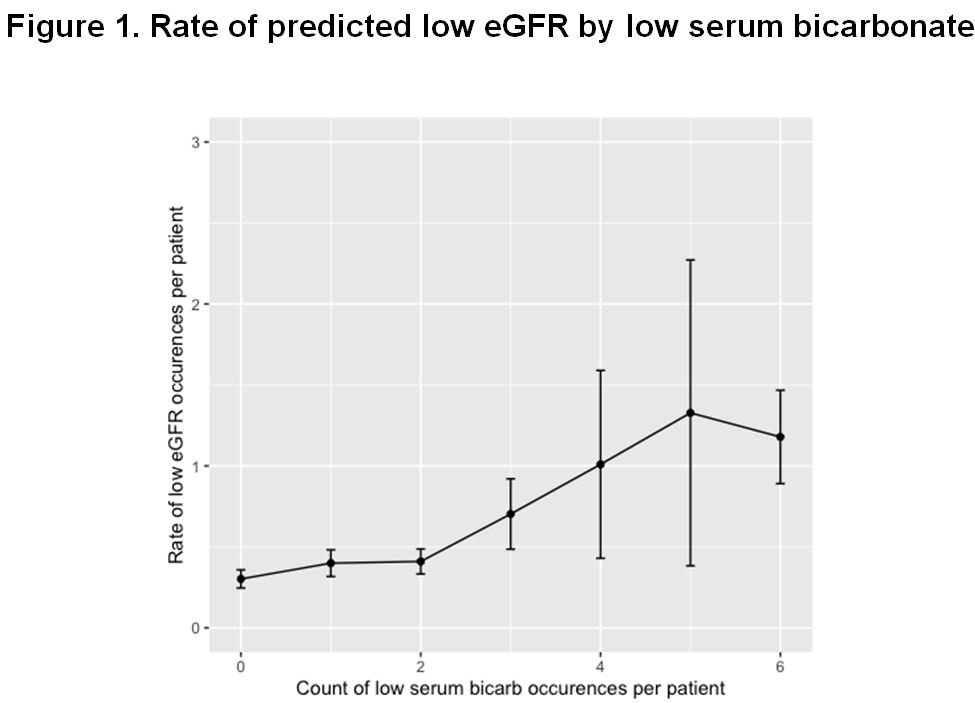Session Information
Session Type: Poster Session C
Session Time: 9:00AM-11:00AM
Background/Purpose: Scleroderma renal crisis (SRC) is a well-characterized condition in patients with systemic sclerosis, but systemic sclerosis patients frequently develop chronic kidney disease (CKD) without prior evidence of SRC. Retrospective analyses have shown that low serum bicarbonate predicts kidney failure and death in the general population. This study investigates the potential association of low serum bicarbonate levels (< 22 mmol/L) and the development of reduced kidney function in patients with SSc.
Methods: This was a retrospective cohort study comprised of patients with limited or systemic sclerosis (SSc) by 2013 ACR/EULAR criteria. Patients were recruited for participation from the University of Utah SSc Clinic from October, 2012 to March, 2017. Index and follow up bicarbonate levels and associated eGFR values were recorded. A serum bicarbonate level < 22 mmol/L and an eGFR < 60 ml/min/1.73m2 were considered low values for the purposes of this study. Patients with normal versus low serum bicarbonate levels at index date were followed and compared longitudinally during the study period for the development of kidney dysfunction, manifested by low eGFR. A zero-inflated Poisson (ZIP) regressions model was applied to estimate the rate of predicted low eGFR labs associated with low serum bicarbonate occurrences per patient.
Results: 143 patients met inclusion requirements for evaluation and had normal kidney function determined by eGFR at index date. In this SSc cohort, with each one count increase in low serum-bicarbonate labs, the rate of low eGFR labs increased (aIRR: 1.21; 95% CI: 1.05-1.40). This was a significant increase with P=0.01.
Conclusion: In a single center SSc cohort, low serial serum bicarbonate was associated with increased rates of reduced kidney function. Awareness of this association provides a means to screen for higher risk SSc patients and potentially intervene, given the reduction in morbidity and mortality seen with bicarbonate supplementation in patients with CKD in the general population.
 The rate of predicted low eGFR occurrences, with error bars, plotted against the count of low serum-bicarbonate occurrences per patient .
The rate of predicted low eGFR occurrences, with error bars, plotted against the count of low serum-bicarbonate occurrences per patient .
To cite this abstract in AMA style:
Meier M, Stever J, Wright J, Frech T, Stoddard G, Tingey B. Should Systemic Sclerosis Patients with Low Bicarbonate Have Replacement to Prevent Renal Dysfunction? [abstract]. Arthritis Rheumatol. 2020; 72 (suppl 10). https://acrabstracts.org/abstract/should-systemic-sclerosis-patients-with-low-bicarbonate-have-replacement-to-prevent-renal-dysfunction/. Accessed .« Back to ACR Convergence 2020
ACR Meeting Abstracts - https://acrabstracts.org/abstract/should-systemic-sclerosis-patients-with-low-bicarbonate-have-replacement-to-prevent-renal-dysfunction/
